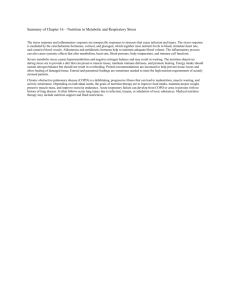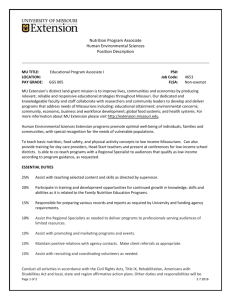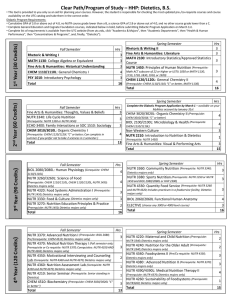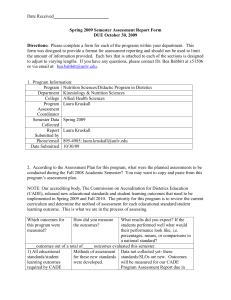A Public Health Nutrition Collateral
advertisement
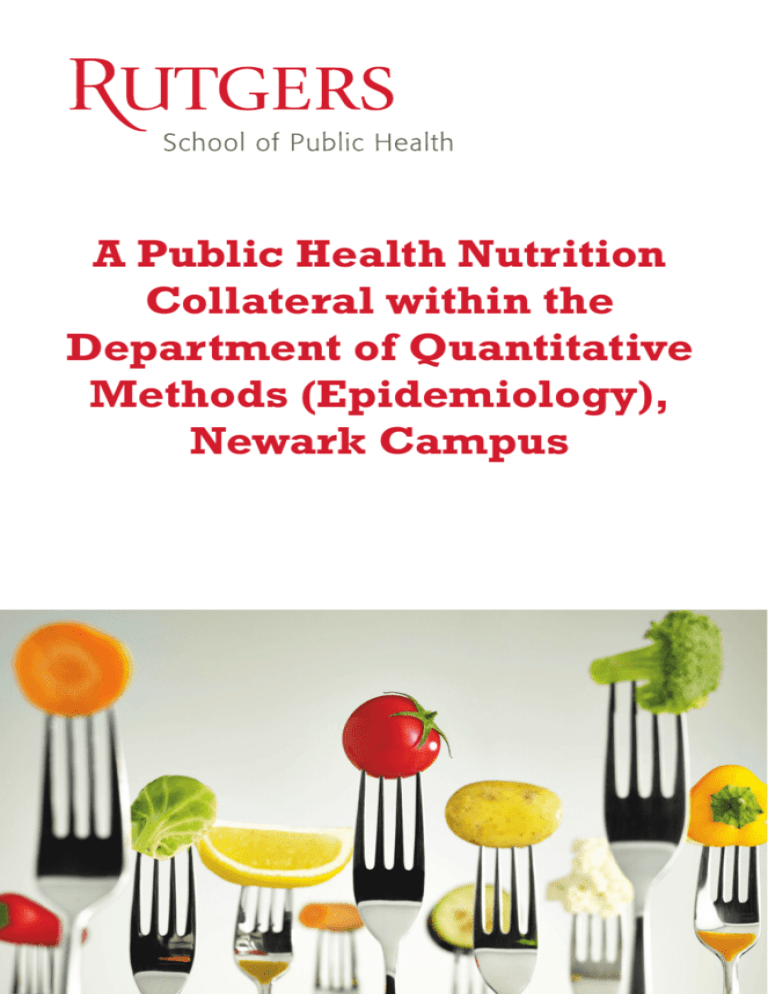
A Public Health Nutrition Collateral within the Department of Quantitative Methods (Epidemiology), Newark Campus Nutrition is an integral component of health and wellbeing of the population and is important for the improvement and promotion and health of populations. While Registered Dietitians/ Nutritionists (RD/RDNs) are the only credentialed nutrition/ dietetics practitioners, nutrition spans across many disciplines and is a component of public and community health, as well as health care planning, practice, administration, and research. The Surgeon General’s Report, the Institute of Medicine Report and other federal and professional association guidelines speak to the need for nutrition as a component of health professions education. The Public Health Nutrition collateral is offered in partnership with Rutgers School of Health Related Profession’s (SHRP) Graduate Programs in Clinical Nutrition. Curriculum for MPH Quantitative Methods: Epidemiology with a collateral in Public Health Nutrition Public Health Core Courses: (15 credits) PHCO 0501 - Health Care Systems and Policy PHCO 0502 - Principles of Epidemiology PHCO 0503 - Introduction to Environmental Health PHCO 0504 - Introduction to Biostatistics PHCO 0505 - Health Education and Behavioral Science in Public Health Quantitative Methods Requirements (15 credits) QNME 0611 - Design of Epidemiologic Studies and Clinical Trials QNME 0612 - Linear Models: Regression and ANOVA QNME 0587 - Introduction to SAS for DATA analysis in Public Health (2 credits) QNME 0584 - Computing II: EPI Info (1 credit) QNME 0621 - Survey Research Methods Questionnaire Design QNME 0614 - Categorical Data Analysis Fieldwork I and II (6 credits) Each student will have an epidemiology faculty advisor and a nutrition collateral advisor. The fieldwork project must be approved by both faculty advisors. The nutrition faculty advisor may serve as the fieldwork faculty advisor. For further information about the MPH in Quantitative Methods or the Public Health Nutrition collateral, contact Marian R. Passannante, Professor and Interim Chair (designate), Quantitative Methods: Epidemiology & Biostatistics) at marian.passannante@rutgers.edu. If interested in certification as a Registered Dietitian or SHRP degree programs, contact Riva Touger-Decker (Professor and Chair, Department of Nutritional Sciences, SHRP) at decker@shrp.rutgers.edu. Students must complete 45 credits of academic work with an average grade of “B” or better. Courses are three credit hours unless otherwise noted. Public Health Nutrition Collateral Courses (9 credits) NUTR 6490 - Nutrition Epidemiology Applied Nutritional Sciences (choose one of the following two): NUTR 6300 - Vitamin & Mineral Metabolism NUTR 7210 - Human Metabolism and Body Composition Notes: If students choose to take both Applied Nutritional Sciences courses above, students must still choose a course below; therefore, graduating with more than 45 credits. Behavioral and Social Factors Related to Nutrition (choose one of the following nine): NUTR 6160 - Weight Management and Disordered Eating NUTR 6270 - Nutrition and Exercise Physiology NUTR 6300 - Vitamin & Mineral Metabolism NUTR 6310 - Pediatric Nutrition NUTR 6420 - Nutrition and Aging NUTR 6505 - Ethical Issues in Health Care Practice NUTR 7210 - Human Metabolism and Body Composition NUTR 7215 - Nutrition and Behavioral Management NUTR 7310 - Nutrition Informatics All Public Health Nutrition Collateral Courses (NUTR) are offered online. ABOUT RUTGERS SCHOOL OF PUBLIC HEALTH The Rutgers School of Public Health serves a vital function in New Jersey. With its faculty and students, the school yy Addresses public health issues and how the issues affect length and quality of life; and yy Provides an exceptional, high-quality education that is `` Accessible; `` Affordable; and `` Designed to accommodate today’s working professionals. In addition to the MPH, Certificate programs, an MS in Biostatistics degree, an MS in Biostatistics-Pharmaceutical Biostatistics degree, an MS in Health Outcomes, Economics and Policy, and PhD and DrPH degrees are offered as well as a number of dual degree opportunities. With educational opportunities offered in New Brunswick, Newark and Stratford, the School is conveniently accessible from across the state. Numerous continuing education opportunities are also available at the school. The evening schedule makes it convenient for students to continue working or gain experience while earning their public health degree or certificate. Students have opportunities to participate in leading public health research. Plus, students can put their public health education into practice through participating in our international health or community service projects, organized by the Student Government Association and V.O.I.C.E.S. (Volunteer Opportunities In Community Engaged Service), a student run organization at the School. FOR MORE INFORMATION Rhonda Barnes, Newark Campus Administrative Coordinator of Admissions Rutgers School of Public Health Stanley S. Bergen Bldg, 65 Bergen St, Room 701 Newark, NJ 07101 t. 973-972-7212 f. 973-972-8032 barnesrb@sph.rutgers.edu sph.rutgers.edu Rutgers, The State University of New Jersey Mar 2014


